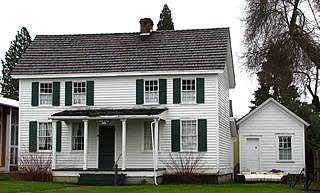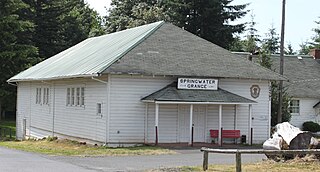
Oregon City is the county seat of Clackamas County, Oregon, United States, located on the Willamette River near the southern limits of the Portland metropolitan area. As of the 2020 census, the city population was 37,572. Established in 1829 by the Hudson's Bay Company, in 1844 it became the first U.S. city west of the Rocky Mountains to be incorporated.

Clackamas County is one of the 36 counties in the U.S. state of Oregon. As of the 2020 census, the population was 421,401, making it Oregon's third-most populous county. Its county seat is Oregon City. The county was named after the native people living in the area at the time of the coming of Europeans, the Clackamas people, who are part of the Chinookan peoples.

Estacada is a city in Clackamas County, Oregon, United States, about 30 miles (48 km) southeast of Portland. The 2020 population is estimated to be 3,700. According to the 2010 census, the population in 2010 was 2,695.

Molalla is a city in Clackamas County, Oregon. The population was 10,228 at the time of the 2020 census.

Julian Clare May was an American science fiction, fantasy, horror, science and children's writer who also used several literary pseudonyms. She is best known for her Saga of Pliocene Exile and Galactic Milieu Series books.

Forest Park is a public municipal park in the Tualatin Mountains west of downtown Portland, Oregon, United States. Stretching for more than 8 miles (13 km) on hillsides overlooking the Willamette River, it is one of the country's largest urban forest reserves. The park, a major component of a regional system of parks and trails, covers more than 5,100 acres (2,064 ha) of mostly second-growth forest with a few patches of old growth. More than 80 miles (130 km) of recreational trails, including the Wildwood Trail segment of the city's 40-Mile Loop system, crisscross the park.

The Portland metropolitan area is a metro area with its core in the U.S. states of Oregon and Washington. It has 5 principal cities, the largest being Portland, Oregon. The U.S. Office of Management and Budget (OMB) identifies it as the Portland–Vancouver–Hillsboro, OR–WA Metropolitan Statistical Area, a metropolitan statistical area used by the United States Census Bureau (USCB) and other entities. The OMB defines the area as comprising Clackamas, Columbia, Multnomah, Washington, and Yamhill Counties in Oregon, and Clark and Skamania Counties in Washington. The area had a population of 2,512,859 at the 2020 census, an increase of over 12% since 2010.

Damascus is a census-designated place and former city in Clackamas County, Oregon, United States. Established in 1867, it was incorporated in 2004 in an effort to enable local land use decision-making control by the community. The citizens voted to disincorporate in 2016, and, after a legal challenge, disincorporation was completed in 2020. Damascus is located east of Happy Valley and Interstate 205 and west of Boring. The population was 11,050 residents as of the 2020 census.

Robert Michael Pyle is an American lepidopterist, writer, teacher, and founder of the Xerces Society for Invertebrate Conservation. Much of his life story is told in the 2020 feature film The Dark Divide, where Pyle is played by David Cross.

The Clackamas Town Center Transit Center is a bus transit center and MAX Light Rail station, located in Clackamas County, Oregon, in the southeastern part of the Portland metropolitan area. Clackamas Town Center TC is the southern terminus of the MAX Green Line, which began service in 2009.

Colton is an unincorporated community located in Clackamas County, Oregon, United States, on Oregon Route 211. Colton is located between the cities of Estacada and Molalla.

Eagle Creek is an unincorporated community in Clackamas County, Oregon, United States. It is located seven miles southwest of Sandy, seven miles north of Estacada, and five miles southeast of Carver, at the junction of Oregon Routes 224 and 211, on the Clackamas River.
William Kittredge was an American writer from Oregon, United States, who lived mostly in Missoula, Montana.
Vortex I: A Biodegradable Festival of Life, more commonly known as just Vortex I, was a week-long rock festival in Oregon in 1970. It was sponsored by the Portland counterculture community, with help from the state of Oregon in Clackamas County near Portland. The festival was meant to demonstrate the positive side of the anti-War Movement and to prevent violent protests during a planned appearance by President Richard Nixon at a convention of the American Legion. Nixon ended up cancelling his appearance due to scheduling conflicts, with Vice President Spiro Agnew appearing instead. It remains the only state-sponsored rock festival in United States history.

Springwater is an unincorporated rural community in Clackamas County, Oregon, United States, about three miles (4.8 km) south of Estacada on Oregon Route 211. So named since pioneer days, it was one of the first places on the upper Clackamas River to have a post office. Springwater post office ran from 1874 to 1914, with George A. Crawford as the first postmaster. The historic wooden Springwater Presbyterian Church was built c. 1890. The Springwater Grange has celebrated a Springwater Fair every year since 1923.

Cazadero is an unincorporated historic locale in Clackamas County, Oregon, United States. Cazadero was a station on the Estacada interurban railway line of the Portland Railway, Light and Power Company (PRL&P) and later Portland Electric Power Company (PEPCO), near where the power plant of the PEPCO-owned Cazadero Dam was located on the Clackamas River.

The following published works deal with the cultural, political, economic, military, biographical and geologic history of pre-territorial Oregon, Oregon Territory and the State of Oregon.
John Sibley Williams is an American poet, educator, and literary agent. He is the author of "As One Fire Consumes Another", "Skin Memory" (winner of the 2018 Backwaters Poetry Prize, "Disinheritance", and "Controlled Hallucinations", as well as six chapbooks. He has edited three regional poetry collections and works as editor of the poetry journal The Inflectionist Review.
Dreams Like Thunder is a 1992 novel written by Oregon author Diane Simmons. It won the Oregon Book Award for fiction in 1993. Its story takes place over a few days in summer 1959, on a farm in Eastern Oregon, and concerns a family visit by relatives who have been living in Japan. The protagonist is confronted with information about her grandfather, one of the valley's first settlers, massacring local Native Americans. A review in the Oregon Historical Quarterly described the grandmother as "the most vivid, complex, and vital character."














